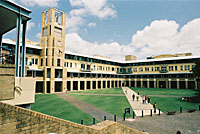| Ethics and Society - PHIL1008 |
|
|||||||||||||||||||||||||||||||||||||

Description This is political philosophy and moral philosophy at the intersection of the political with the personal. When we make decisions in important areas such as euthanasia, reproductive freedom and reproductive technology, the allocation of health resources or the environment, we must balance the rights and duties of the individual with the demands and obligations of society. This team-taught course considers the moral issues raised by such decisions, along with some of the political, philosophical principles which inform our public debate. Also examines the nature and justification of rights, as well as contemporary concepts of justice and equality.
Learning Outcomes Upon successful completion of this course, students should:
Assessment
|
||||||||||||||||||||||||||||||||||||||

| Contacts | Library | myUNSW | WebCT |